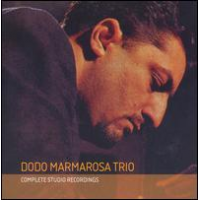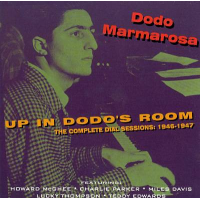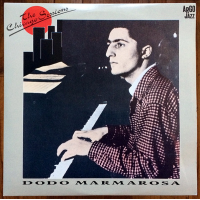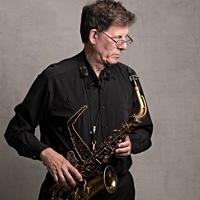Home » Jazz Musicians » Dodo Marmarosa
Dodo Marmarosa
A piano wunderkind who was for about a decade one of the most sought-after pianists in the history of jazz, yet has remained in relative obscurity. Dodo was born Michael Marmarosa, on 6 December 1925, in Pittsburgh, Pennsylvania. After formal studies and gigging with local bands, in 1941, the Johnny "Scat" Davis Orchestra came to Pittsburgh with an opening for a piano player. Even as a kid, Marmarosa had a reputation in local jazz circles, and some local musicians suggested that Davis snatch up the young pianist, so he hit the road. He was 15.
After a few months, the orchestra broke up. But Marmarosa and a few others hooked up with Gene Krupa's band. He then joined Charlie Barnet's big band. During that time, the Barnet band recorded "The Moose" and "Strollin,' " the first of dozens of recordings Marmarosa would be part of over the next few years.
By early 1944, at age 18, he left Barnet's band to join Tommy Dorsey. The band featured a quartet including Marmarosa, Buddy De Franco, Sidney Block and Buddy Rich. For Marmarosa, playing with Dorsey was another in a series of dead-end jobs made tolerable by the opportunity to work regularly with Rich.
In November 1944, Marmarosa left Dorsey and joined Artie Shaw's band, which was considered one of the best big bands in the country. Shaw, like Dorsey, featured a small combo from the band, known as the Grammercy-Five. With it, Marmarosa found more opportunity to improvise, and the group made several popular recordings. The group also featured guitarist Barney Kessel and fellow Pittsburgher and trumpeter Roy Eldridge.
In 1946, he settled in Los Angeles. His position as house pianist for the Atomic label saw him playing and recording with several leading jazz musicians, including Barney Kessel, Lester Young and Charlie Parker.(“Relaxin’ at Camarillo”) There are two other recordings from this timeframe, “Piano Man,” (’46) and “Live Dodo.” (’47) His affinity with bebop made him, briefly, one of the outstanding exponents of the form, but ill-health drove him from the scene around 1948.
In the mid-1950s, Marmarosa was drafted into the Army. Military life had an emotional effect on him and he was discharged after spending several months in the hospital. Upon his return to Pittsburgh, he made no attempt to re- enter the national jazz scene. He worked briefly at the Midway Lounge in Downtown Pittsburgh, where he and close friend Danny Conn recorded "Pittsburgh, 1958."
Read moreTags
Forgotten Jazz Musicians On Their Centennial, Part 2:

by Larry Slater
As we look back on jazz history, we all have a tendency to focus on the giants: Duke Ellington, Charlie Parker, John Coltrane and Miles Davis.Many other talented artists from the past decades have been forgotten, but many of their recordings have stood the test of time. The musicians featured in this hour were born in 1925, and this hour-long program pays tribute to them on the centennial of their birth.June Christy is best remembered for ...
Continue ReadingCharlie Parker: Birth Of Bebop - Celebrating Bird At 100

by Mark Corroto
Let's face it, there is absolutely nothing new to say about the music of Charlie Parker, unless (insert joke here) you happen to be Phil Schaap. Lao Tzu's quote “The flame that burns twice as bright burns half as long" is fitting. John Coltrane was 40 when he died in 1967, Eric Dolphy 36 in 1964, and Clifford Brown died at 25 in 1956. Parker was dead at the age of thirty-five in 1955. His legend has grown larger with ...
Continue ReadingBackgrounder: Dodo Marmarosa — Dodo's Back!
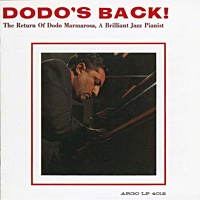
Source:
JazzWax by Marc Myers
Yesterday, I posted about pianist Craig Davis's new trio tribute to Dodo Marmarosa. I also promised you a fabulous Backgrounder album this week by Marmarosa. Well, why not today, since you probably still have Dodo on your in mind. Dodo's Back! is one of my favorites. It's elegant and pushy, with touches of George Shearing in places. Recorded in Chicago in May 1961, the album was released in 1962. Marmarosa was backed by Richard Evans on bass and Marshall Thompson ...
read more
Craig Davis: Music of Dodo Marmarosa

Source:
JazzWax by Marc Myers
Michael “Dodo" Marmarosa was a fascinating jazz pianist. Among the first pianists to master bebop in the mid-1940s, he had an accomplished, plush touch. As I wrote back in 2008, “Dodo was less aggressive than Bud Powell and more expressive and complex than Al Haig. He preferred a punctuating, full keyboard approach, developing ideas in the middle and widening out to express them." Marmarosa also was much in demand early on. He was skilled enough to play piano for many ...
read more
Dodo Marmarosa: Troubled Pianist Made Brief But Lasting Impact On Jazz

Source:
All About Jazz
Michael “Dodo" Marmarosa was a reclusive personality who flitted in and out of jazz history after making an initial but lasting impact as one of the progenitors of bebop in the mid to late 1940s. He was said to have been a prodigiously gifted child at the piano in his native Pittsburgh, where his school mates included pianist Errol Garner. He studied classical piano before turning to jazz. He was given the rather unflattering nickname of Dodo because of his ...
read more
Michael "Dodo" Marmarosa: Legendary jazz pianist

Source:
Michael Ricci
Michael “Dodo" Marmarosa, a piano wunderkind who was for about a decade one of the most sought-after pianists in the history of jazz, died Tuesday of an apparent heart attack. He was 76. For the past few years, Mr. Marmarosa was a resident at the VA Medical Center in Lincoln Lemington, where he occasionally played piano and organ for other residents and guests. On the day of his death, his sister, Doris Shepherd of Glenshaw, said he played a small ...
read more

